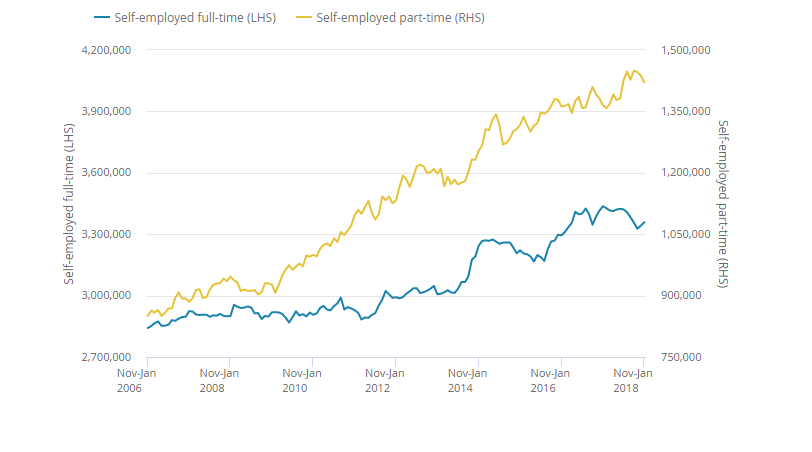
The last UK Labour Market bulletin released by the Office for National Statistics spotlighted that the employment rate in that country is at its highest level (75%) since comparable records began back in 1971. That means that there are more that 32 million people making their living in Britain under working conditions, with full-employment rates also increasing and economically inactive people decreasing at high pace.
It seems that everything is working just fine on British soil.
However, the problem actually lies in the quality of that job and how much a worker get from it. Unfortunately, the good news end at this point, because these astonishing numbers shown on the UK Labour Market bulletin are not currently keeping up with the wages, and “while the UK economy expands, real earnings continue to fall” a slightly 0.2% this year, inflation sorted indeed.
Away with the good news already, reality stomp on the figures and shows off warning lights. There are workers out in the labour market who just get enough to pay the bills, or they even need to make extra hours just to make it until the end of the month.
A worrying matter gathered also in the bulletin: “perhaps more importantly, it remains the case that for any 100 people who work full time, the number of people who want to work more hours is higher now than it was prior to the economic downturn”, or how is usually called as under-employment.

The under-employment risk: Gig Economy workers
Among those workers who really are having a hard time are those who take part in the so-called Gig Economy, which is estimated that more than five million strong in the UK are employed in this type of capacity.
In the gig economy, instead of a regular wage, workers get paid for the “gigs” they do, such as a food delivery or a car journey.
Jobs include couriers, ride-hailing drivers and video producers. Proponents of the gig economy claim that people can benefit from flexible hours, with control over how much time they can work as they juggle other priorities in their lives.
At least that is what they claim as pros.
On the cons side, they risk being denied working rights with high exposure to uncertainty for being cast out from their contractors at any time.
Indeed, the flexible nature often offers benefits to employers, as they only pay when the work is available, and don’t incur staff costs when the demand is not there. Meanwhile, workers in the gig economy are classed as independent contractors. That means they have no protection against unfair dismissal, no right to redundancy payments, and no right to receive the national minimum wage, paid holiday or sickness pay.
And if that weren’t enough, they also face risk of losing future pension allowance as they might be labelled wrongly as self-employed.
So far, and as tipped out by The Guardian recently, “more than a million workers in Britain’s gig economy risk losing more than £22,000 each from being wrongly labelled as self-employed, according to research that shows the dangers posed to people in fragile employment.”
The insurance firm Zurich said forcing gig economy companies to classify their workers as employees rather than self-employed would mean automatic enrolment in a workplace pension. Under these rules, it estimates a typical worker aged 25 and earning £25,000 a year would receive a total of £22,000 in employer contributions by the time they retire.

The issues that some gig workers have to face have been also collected by the nongovernmental organization Institution of Occupational Safety and Health (IOSH).
In their last survey, they state that “Gig economy workers, temps and workers on zero-hours contracts report receiving fewer protections for their health and wellbeing at work than their permanent, full-time colleagues.”
That means that many are working when sick (64%) , working unpaid overtime (25%) and going throughout the year without a paid holiday (43%), the IOSH-commissioned Opinium survey found so far.
Utterly, these type of workers face workers problems without having the benefits of one, which may lead to a even more unfair under-employment status in the near future if nothing is done to reverse the situation.
Another opportunity missed
Some voices are claiming for a fairer relationship between gig workers and contractors, but after the lack of response by recent Uber scandals or Deliveroo, the only hope lies on the government side.
Regulators need to catch up as employment law is lagging far behind advances in working practices, which is leaving some people in the gig economy at risk of being denied basic rights.
Latest news aren’t quite for the hope though, as the government delayed reforms designed to improve the rights for millions of workers in the gig economy until next year.
No matter how good the Labour Market seems to go in the UK, it is quite far from being called healthy, at least not for those 5.5 million in the Gig Economy.

Hernaldo Turrillo is a writer and author specialised in innovation, AI, DLT, SMEs, trading, investing and new trends in technology and business. He has been working for ztudium group since 2017. He is the editor of openbusinesscouncil.org, tradersdna.com, hedgethink.com, and writes regularly for intelligenthq.com, socialmediacouncil.eu. Hernaldo was born in Spain and finally settled in London, United Kingdom, after a few years of personal growth. Hernaldo finished his Journalism bachelor degree in the University of Seville, Spain, and began working as reporter in the newspaper, Europa Sur, writing about Politics and Society. He also worked as community manager and marketing advisor in Los Barrios, Spain. Innovation, technology, politics and economy are his main interests, with special focus on new trends and ethical projects. He enjoys finding himself getting lost in words, explaining what he understands from the world and helping others. Besides a journalist, he is also a thinker and proactive in digital transformation strategies. Knowledge and ideas have no limits.































